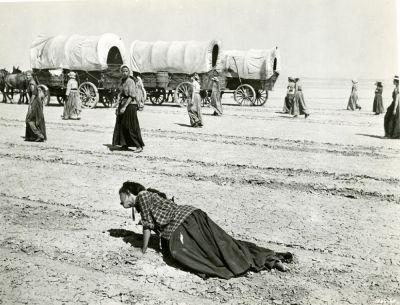
WESTWARD THE WOMEN
(Donne verso l'ignoto, USA/1951) R.: William Wellman. D.: 116'. V. inglese
T. it.: Donne verso l'ignoto Sog.: Frank Capra. Scen.: Charles Schnee. F.: William Mellor. M.: James E. Newcom. Scgf.: Daniel B. Cathcart, Cedric Gibbons. Mus.: Jeff Alexander. Int.: Robert Taylor (Buck Wyatt), Denise Darcel (Fifi Danon), Hope Emerson (Patience), John McIntire (Roy Whitlock), Renata Vanni (Mrs. Maron), Julie Bishop (Laurie [Smith]). Prod.: Dore Schary per Metro-Goldwyn-Mayer Corp.
35mm. D.: 116'. Versione inglese / English version
Da: Filmoteca Eşpañola per concessione di Park Circus
Se si pensa al ruolo centrale conquistato dalle donne nei western degli anni Cinquanta (Joan Crawford in Johnny Guitar, Barbara Stanwyck in Quaranta pistole), è strano che tra i migliori film di quel glorioso decennio sia citato così raramente Westward the Women di Wellman, splendido ritratto di un gruppo femminile. Nonostante The Ox-Bow Incident e Yellow Sky possano vantare una fama più solida, questo western è uno dei migliori del regista. Una carovana di donne guidata da Robert Taylor ripropone più o meno le vicende di Fiume rosso. Il film è meno profondo del capolavoro di Hawks e in un certo senso più duro e realistico quando si tratta di descrivere le difficoltà e le sconfitte della vita. Un altro grande film di quegli anni, La carovana dei mormoni di Ford, appare quasi romantico al confronto. Wellman è un duro che sa unire tenerezza e crudeltà in modo sorprendente. In Wild Boys on the Road un ragazzo perde una gamba in un incidente e in Westward the Women un bambino di dieci anni viene ucciso per sbaglio dalla madre che si esercita a sparare. Questa totale imprevedibilità è un elemento centrale del fascino di Wellman. Westward the Women conferma che l'elemento più congeniale a Wellman è la pioggia, qui mescolata alla polvere, ai tuoni, a immagini di cavalli intrappolati nella sabbia e più generalmente a una disperata lotta per la sopravvivenza. In questo film tutto sembra remare contro, producendo una visione di sangue, sudore e lacrime che minaccia di trasformare la terra promessa in un'allucinazione. Ma il sogno non svanisce, e con la nascita di una nuova vita il regista sa sapientemente creare un evento collettivo. Film corale e poco divistico, e forse proprio per questo meno noto di quanto meriterebbe, Westward the Women pone al centro della scena tante donne sconosciute che nel loro viaggio verso l'ignoto "perdono la vita, e conquistano l'immortalità".
Peter von Bagh
Thinking about how women made their way into the center of westerns in the Fifties (Joan Crawford in Johnny Guitar, Barbara Stanwyck in Forty Guns), it's strange how seldom Wellman's remarkable portrayal of a female group is mentioned in lists of the finest 1950s westerns, the greatest decade for that form. Both The Ox-Bow Incident and Yellow Sky might have bigger reputations and yet, poignantly, Westward Women is a strong candidate for Wellman's finest western. A female trek, even though it is led by Robert Taylor, more or less re-enacts the story of Red River. The narrative is less deep than Hawks' masterpiece, and in some sense it is harsher, more realistic about the difficulties and facts of loss. Another great contemporary film, Ford's Wagonmaster, is somehow romantic by comparison. Wellman was a tough guy who could create an amazing combination of tenderness and cruelty. In Wild Boys on the Road, a boy loses his leg in an accident, and in Westward the Women an Italian lady is practicing with guns and kills her ten year old son, accidentally. This is a central element of Wellman's charm: total unpredictability. As we know, and this film verifies it fully, Wellman's true basic element was rain, here complemented with dust, storm, thunder, images of horses stuck in the sand, or more generally everything breathing the fight to survive. But there are contrary forces at work as well. The harsh circumstances - a vision of blood, sweat, tears - could easily make the perspective of the promised land look like a hallucinatory dream, bound to vanish - but it does not. That is why he gives us a scene of a baby being born, with the art to create the feeling of a collective birth event. Maybe this is why the film is less well-known than it should be: with no female stars pushed to the foreground, it is authentically about a collective. It's about those who "died nameless but achieved immortality".
Peter von Bagh

Tariffe:
Aria condizionata
Info: 051224605











